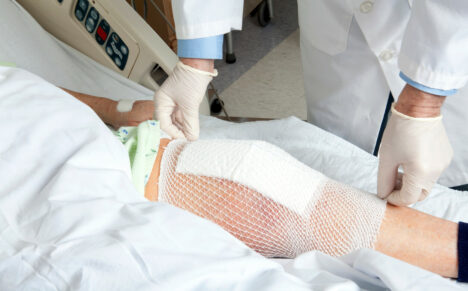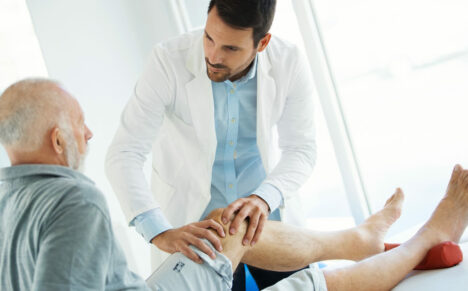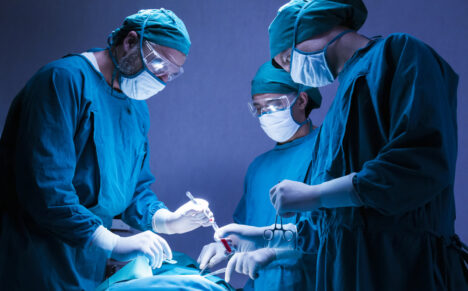Knee replacement surgery is a significant medical procedure that has the potential to greatly improve your quality of life. By eliminating pain and restoring physical function, it allows many individuals to return to the activities they love. Yet, living with a knee replacement also involves a commitment to proper care and lifestyle choices to ensure long-term success.
Understanding the journey after knee replacement and adopting certain practices can make a tremendous difference, so let’s explore how you can thrive after your surgery.
A Brief Introduction to Knee Replacement
A knee replacement, or a total knee arthroplasty, is a surgical procedure to replace the weight-bearing surfaces of the knee joint to alleviate pain and disability. This procedure is most commonly performed for advanced osteoarthritis, which causes the joint cartilage to break down, and also for other conditionssuch as rheumatoid arthritis or a severe knee injury.
Knee replacement surgery is typically only considered when conservative treatments no longer work to alleviate symptoms. There are different knee replacement procedures available, including minimally invasive total knee replacement surgery, MAKOplasty robotic-assisted knee replacement, and partial knee replacement surgery. The surgery that is best for you will depend on factors, such as the condition of the knee joint and the severity of the damage, lifestyle, overall health, and medical history.
During surgery, the damaged parts of the knee joint are removed and replaced with artificial components called prostheses made from metal alloys, high-grade plastics, and polymers. It’s a transformative intervention that has enabled countless people to lead active and pain-free lives following years of joint degeneration.
Preparation for Surgery
Preparation for knee replacement surgery begins long before you even enter the operating room. Engaging in pre-operative exercises and making lifestyle adjustments can help strengthen your muscles, boost your overall health, and ensure a much smoother recovery.
Your knee surgeon, along with a physical therapist, can provide tailored advice and exercises to enhance joint flexibility and muscle strength, as well as dietary recommendations to optimize your health pre-surgery.
If you’re a smoker, you will need to quit prior to your surgery. This is because smoking can significantly increase the risk of complications during and after surgery. It affects the immune system and blood circulation, which can delay healing andreduce the body’s ability to deliver important nutrients needed for healing. Smoking also increases the risk of infection at the surgical site.
Ensuring you are in optimal health before the procedure not only reduces the risk of complications during and after surgery, it also promotes a quicker recovery and helps to improve the overall outcome of the procedure.
Recovery and Rehabilitation
Advances in joint replacement surgery mean patients can expect more rapid recovery progress and better outcomes than ever before. The road to recovery starts immediately after surgery to promote healing and ensure the long-term success of the knee replacement.Your rehabilitation plan will be personalized to your exact needs and requirements.
Physical Therapy
Physical therapy and prescribed exercises are a critical component of the recovery process and play a pivotal role in regaining function. Therapy typically begins soon after surgery to get the new knee joint moving through its range of motion. Treatment includes strengthening exercises, walking with a rolling walker, and other tasks, such as self-care activities, transferring in and out of bed, and climbing stairs. Early and frequent movement of the joint is crucial to recovery and in preventing post-surgery complications, such as blood clots.
Under the guidance of a licensed therapist, you’ll engage in a variety of progressive exercises designed to restore movement, improve balance and strength, and decrease pain and swelling. Physical therapy demands patience and persistence to achieve the best outcomes.
Your therapist will emphasize the importance of continuing your exercises at home to reinforce the benefits gained during therapy sessions. They will also discuss your limitations and teach you the movements you should avoid to protect your new joint while your body heals and strengthens.
The ultimate goal of physical therapy is to ensure your replaced knee can carry you through daily activities with ease and comfort. It’s essential to adhere to the rehabilitation plan and attend all sessions to maximize your knee’s functionality.
Pain Management
Strategies such as ice, elevation, medication and will help manage post-operative pain, but always follow the tailored plan provided by your healthcare provider.
Your surgeon and physical therapist will develop a personalized pain management and rehabilitation plan that considers your unique circumstances, which is key to a successful recovery.
Mobility Aids
Assistive devices can help you navigate the recovery period, while reducing strain on your new knee. Using walkers, canes, or crutches correctly, as advised by your provider, will aid in a safe and gradual return to regular movement.
Adapting Daily Activities
Adjusting how you handle daily tasks is essential. Small changes in how you perform chores, personal care, and other everyday tasks can protect your knee from excessive stress and injury.
Home Modifications
Consider modifying your living space based on the guidance from your surgeon and rehabilitation team, which may include installing handrails, a raised toilet seat, or a shower bench to enhance safety.
Maintaining a Healthy Lifestyle
Exercise and Activity
Regular low-impact activities like walking, swimming, and cycling are encouraged to keep your joint functioning well. An active lifestyle, along with proper exercises, is crucial for maintaining the strength and longevity of your knee replacement.
Nutrition and Weight Management
A healthy diet helps maintain joint health and in controlling your weight, which can decrease the pressure on prosthetic joints. Your healthcare team can provide further insights and resources into the role of nutrition in post-operative health.
Long-Term Success and Follow-Up Care
Your orthopedic surgeon and physical therapist will work together to identify ways to help you to continue to recover well. This will include:
Regular Check-Ups
Monitoring your knee health with regular check-ups and follow-up appointments is vital. These visits ensure that your knee is functioning as expected and any complications are caught early.
Prosthesis Management
Proper care and management of your prosthesis can prevent complications. Your healthcare team can offer guidance on how to safeguard the longevity of your artificial knee.
Help and Support
It’s also important to acknowledge that knee replacement is major surgery and everybody’s recovery is different. Seeking help and support from family and friends can help you recover at your own pace and build up your independence gradually. Support groups can also be useful in providing practical information, an opportunity to ask questions about living with a knee replacement,anda place to share experiences.
Living with a knee replacement is an ongoing process that requires attention and care. With the proper preparations, rehabilitation, and lifestyle adjustments, you can enjoy a fuller, more active life post-surgery. For more comprehensive advice on each stage of the knee replacement journey, consult with your healthcare provider.
Knee Replacement in Raleigh, Durham, and Apex, NC
If you are considering knee replacement surgery or exploring other treatment options for knee pain, visit board-certified and fellowship trained orthopedic surgeon Dr. Brett J. Gilbert for expert care.
Dr Gilbert provides a wide range of treatment options and specializes in knee and hip arthritis and minimally invasive, muscle-sparing joint replacement surgery. He can assess your condition and provide you with the guidance and expertise you need to make an informed decision about your treatment.
To find out more about the treatments offered by Dr. Gilbert, call our office at (919) 788-8797. You can also request an appointment with Dr. Gilbert using our appointment request form, or you can self-schedule your appointment here. Don’t delay; let us work with you to get you back doing the activities you enjoy as quickly as possible.




